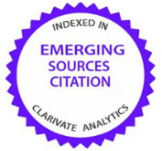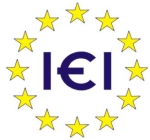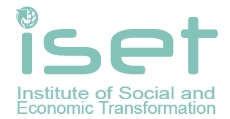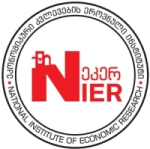Methodological approaches on the selection of options for innovational development of regional industrial complex
Abstract
Introduction. In an unstable economic environment, the formation of a regional industrial complex under conditions of uncertainty and risk factors leads to the fact that the innovative processes of the creation of the final product significantly deviate in time and space from its planned development.
The sources of the formation of these factors and means of recording in the assessment of efficiency should be considered.
Aim and tasks. Consider approaches to choosing innovative development options for a regional industrial complex under conditions of uncertainty and risk.
Research results. Under the uncertainty one should understand the lack of data on the conditions in which economic activity will be thwarted, a low degree of predictability, increase of these conditions.
When assessing innovation and investment projects in the region, the most important are the following types of uncertainties and regional risks: uncertainty about the behavior of competitors; uncertainty about the political and socio-economic situation in the country and region; incompleteness / inaccuracy of information about the parameters of innovations; foreign economic risks; incompleteness of information on financial sustainability; unpredictability of the tax policy; other types of financial risks; some types of risks: the risk of falsification of financial statements, the risk of theft of certain types of assets; emission risk, etc.
Territorial peculiarities in innovative development the role of a significant factor is assigned: they can both accelerate and slow down the formation of the types of their economic activity, and in the broader sense - and the nature of strategic development.
However, the implementation of the chain becomes even more important «new creation - new-introduction – innovation» and the generation of new technologies in this territory, which ensures the uniqueness of industrial production, which causes the formation of a spatially-innovative monopoly in the area of innovation activity.
Conclusion. During the development of innovative processes at enterprises - innovators of the regional industrial complex it is necessary to take into account the specifics of such a complex object as the economic system of the region, factors of uncertainty and risk under the influence of the internal and external environment, especially the stages of the product life cycle/enterprise/industry.
Keywords:
region, development, methodical provision, uncertainty, riskReferences
2. Burkynskyi, B.V. & Lysiuk, V.M. (Eds.). (2008). The strategy of developing a regional industrial complex (landmarks, resources, constraints). Odesa: IPREED NANU [in Ukrainian].
3. Vakhovych, I.M. (2007). The financial policy of sustainable development of the region: the methodology of formation and implementation mechanism. Lutsk: Nadstyria [in Ukrainian].
4. Dubnitsksy, V.I. & Buleev I.P. (Eds.). (2008). Transformation of the industrial complex of the region: problems of development management. Donetsk: Yugo-Vostok [in Russian].
5. Zakharchenko, V.I. (2011). Іnnovative development in Ukraine: science, technology, practice. Odessa: Favorit [in Russian].
6. Zakharchenko, V.I., & Akuliushyna, M.O. (2013). Dynamics of the investment-innovation process in an unstable environment. Kherson: Oldi-plus [in Ukrainian].
7. Zakharchenko, V.I. (2014). Actual issues of innovative development of the state, region, enterprises. Luhansk: Noulidzh [in Ukrainian].
8. Isachenko, D.A. (2009). Small enterprises in the transformational economy of the region. O.: IPREED NANU [in Ukrainian].
9. Merkulov, M.M. (2008). Scientific and technological development and innovation management. Odesa: Feniks [in Ukrainian].
10. Kolisnyk, B.I. (2008). Strategic planning of the efficiency of the operation of the forestry complex of the region. Odessa: Feniks [in Ukrainian].
11. Gruznov, I.I. (2009). Effective organizational and economic governance mechanisms (theory and practice). Odessa: Poligraf [in Russian].
12. Suspitsyina, S.A. (Ed.). (2010). Optimization of territorial systems. Novosibirsk: IEOPP SO RAN [in Russian].
13. Egorshina, A.P. (2008). Management of innovative development of the region. N. Novgorod: NIMB [in Russian].
14. Solokha, D.V. (2012). Functioning and development of innovative potential of socio-economic systems: theory, methodology, practice. Donetsk: VIK [in Ukrainian].
15. Bhalla, G. (2011). Collaboration and Co-creation: New Platforms for Marketing and Innovation. New York: Springer.
16. Enkel, Е., Gassmann, О., & Chesbrough, Н. (2009). Open R&D and open innovation: exploring the phenomenon. R&D Management, 39 (4), 311-316.
17. Ramaswamy, V., & Ozcan, К. (2014). The Co-Creation Paradigm. Stanford: Stanford University Press.
18. Dutta, S., Lanvin, B., & Wunsch-Vincent, S. (2014). The Global Innovation Index 2014: The Human Factor in Innovation. Geneva: WIPO.

This work is licensed under a Creative Commons Attribution-NonCommercial 4.0 International License.
If the article is accepted for publication in the journal «Economics. Ecology. Socium» the author must sign an agreementon transfer of copyright. The agreement is sent to the postal (original) or e-mail address (scanned copy) of the journal editions.






















